Academy for Cultural Diplomacy
Cultural Diplomacy Research

Examples of Interfaith Dialogue that Contribute Toward the Understanding of Global Religious Traditions
In this section, readers can find a list of historical examples of Inter-Faith dialogue as Cultural Diplomacy practiced by different actors and groups. Using different aspects of interfaith and religious relations in order to promote acceptance of religion and tradition, these efforts have, throughout the years, served as a catalyst in developing cooperation and understanding.The term 'Interfaith Dialogue' refers to the positive and cooperative interaction between people of different religions, faiths or spiritual beliefs, with the aim of promoting understanding between different religions to increase acceptance and tolerance. It is an expression of the participants' lived faith lives, and therefore interfaith encounters form communities of awareness. Constructing dialogue between followers of different religions means understanding, through cooperation, the different religious principles and teachings that should benefit all of humanity through the promotion of mutual respect and tolerance. It means coming together and sharing aspects of their respective faiths and striving to understand that which is foreign. What is essential in this respect is that the participants engaging in dialogue lay aside attempts to missionize, which is always accompanied by an attitude of exclusive superiority and can be equated with the spoken or unspoken belief that one's own religion is the "true" way, or effectively the only way.
The power of religion can be used as a major force of unification among divergent factions, and hence it can play a key role in the promotion of global peace and reconciliation, by bringing varying groups together in order to establish and maintain constructive channels of communication and sustainable collaboration. Interfaith dialogue therefore plays a vital role in the field of Cultural Diplomacy, as it can advance world peace by uniting faiths and by fostering reciprocal understanding, acceptance and tolerance amongst disparate religious communities. Inter-faith dialogue can in this way break down walls of division and the barriers that stand at the center of numerous wars, with the objective of achieving peace.
-
1964
PONTIFICAL COUNCIL FOR INTERRELIGIOUS DIALOGUE (PCID)
Speaking, listening, giving and receiving for mutual growth and enrichment through Inter-Religious dialogue, founded in 1964
 The PCID is the central office of the Catholic Church for promoting interreligious dialogue in accordance with the spirit of the Second Vatican Council, in particular the declaration Nostra Aetate. The PCID focuses on the following objectives: the promotion of mutual understanding, respect and collaboration between Catholics and the followers of other religious beliefs; the encouragement to study religions; and the promotion of people dedicated to the cause of interfaith dialogue. Today events of the Council focus on communicating common values and interests to other religious believers and spiritual leaders. It welcomes visitors to Rome, it organizes visits to countries, runs meetings and publishes the journal "Pro Dialogo", containing Church texts on dialogue, articles, and news on dialogue activities throughout the world and an Interreligious Dialogue Directory.
The PCID is the central office of the Catholic Church for promoting interreligious dialogue in accordance with the spirit of the Second Vatican Council, in particular the declaration Nostra Aetate. The PCID focuses on the following objectives: the promotion of mutual understanding, respect and collaboration between Catholics and the followers of other religious beliefs; the encouragement to study religions; and the promotion of people dedicated to the cause of interfaith dialogue. Today events of the Council focus on communicating common values and interests to other religious believers and spiritual leaders. It welcomes visitors to Rome, it organizes visits to countries, runs meetings and publishes the journal "Pro Dialogo", containing Church texts on dialogue, articles, and news on dialogue activities throughout the world and an Interreligious Dialogue Directory. -
Founded 1970
9TH WORLD ASSEMBLY OF RELIGIONS FOR PEACE (2013)
A multi-religious organization aims at sharing a vision of peace through mutual understanding
 Religions for Peace, the organizer of the conference held in Vienna in November 2013, are the world's largest multi-religious organization. Each religion represented in the organization is respected as being held sincerely by the believers of that religion. The aim of the conference was to discern and express elements of a shared positive vision of peace through the finding of shared values and consensus among common elements. The conference addressed the urgent need to "Welcome the Other" thanks to multi-religious action. In this sense, actions should ensure human dignity, promote citizenship and advance shared well-being.
Religions for Peace, the organizer of the conference held in Vienna in November 2013, are the world's largest multi-religious organization. Each religion represented in the organization is respected as being held sincerely by the believers of that religion. The aim of the conference was to discern and express elements of a shared positive vision of peace through the finding of shared values and consensus among common elements. The conference addressed the urgent need to "Welcome the Other" thanks to multi-religious action. In this sense, actions should ensure human dignity, promote citizenship and advance shared well-being. -
1978
INTERFAITH CONFERENCE OF METROPOLITAN WASHINGTON
Advancing justice, building community and nurturing understanding between different cultures and generations
 Created in 1978, the InterFaith Conference of Metropolitan Washington (IFC) brings together eleven historic faith communities to promote dialogue, understanding and a sense of community and to work cooperatively for social and economic justice through the DC region. IFC members currently include the Baha'i, Buddhist, Hindu, Islamic, Jain, Jewish, Latter-day Saints, Protestant, Roman Catholic, Sikh and Zoroastrian faith communities. We work towards creating a just community through coalition-building, education, training and advocacy; by uniting diverse faith leaders to speak and act together; by publishing community resources; and by holding public events including concerts, award ceremonies, lectures, and public dialogues.
Created in 1978, the InterFaith Conference of Metropolitan Washington (IFC) brings together eleven historic faith communities to promote dialogue, understanding and a sense of community and to work cooperatively for social and economic justice through the DC region. IFC members currently include the Baha'i, Buddhist, Hindu, Islamic, Jain, Jewish, Latter-day Saints, Protestant, Roman Catholic, Sikh and Zoroastrian faith communities. We work towards creating a just community through coalition-building, education, training and advocacy; by uniting diverse faith leaders to speak and act together; by publishing community resources; and by holding public events including concerts, award ceremonies, lectures, and public dialogues. -
1994
THE PAPAL CONCERT TO COMMEMORATE THE SHOAH
A key moment in Catholic-Jewish faith relations
 On April 7, 1994, was the first official event held in the Vatican dedicated to the memory of the six million Jews murdered in World War II. Pope John Paul II, Rav Elio Toaff, the Chief Rabbi of Italy, and Oscar Luigi Scalfaro, President of Italy, jointly presided over the event. Around 7,500 invited guests attended the event, including several hundred survivors of the Holocaust, from around the world. A Candelabra was lit in the concert hall by six Holocaust survivors and their descendants. The concert followed the recognition of the State of Israel by the Holy See, about three months earlier, in December 1993. The New York Times reported that in light of the concert, "[s]ome Jews said the Pope had revived the revolution in Catholic-Jewish relations set in motion by Pope John XXIII and the Second Vatican Council."
On April 7, 1994, was the first official event held in the Vatican dedicated to the memory of the six million Jews murdered in World War II. Pope John Paul II, Rav Elio Toaff, the Chief Rabbi of Italy, and Oscar Luigi Scalfaro, President of Italy, jointly presided over the event. Around 7,500 invited guests attended the event, including several hundred survivors of the Holocaust, from around the world. A Candelabra was lit in the concert hall by six Holocaust survivors and their descendants. The concert followed the recognition of the State of Israel by the Holy See, about three months earlier, in December 1993. The New York Times reported that in light of the concert, "[s]ome Jews said the Pope had revived the revolution in Catholic-Jewish relations set in motion by Pope John XXIII and the Second Vatican Council." -
1999
JOINT DECLARATION ON THE DOCTRINE OF JUSTIFICATION
A gesture of unity: the Vatican and Lutheran World Federation sharing common understanding
 On 31 October 1999, representatives of the Vatican and the Lutheran World Federation (LWF) signed a Joint Declaration on the Doctrine of Justification, as a gesture of unity. The document states that the churches now share "a common understanding of our justification by God's grace through faith in Christ." To the parties involved, this essentially resolves the conflict over the nature of justification which was at the root of the Protestant Reformation. In the declaration, both sides acknowledge that the excommunications relating to the doctrine of justification set forth by the Council of Trent do not pertain to the teachings of the Lutheran churches set forth in the text; likewise, the churches acknowledged that the condemnations set forth in the Lutheran Confessions do not apply to the Catholic teachings on justification declared in the document.
On 31 October 1999, representatives of the Vatican and the Lutheran World Federation (LWF) signed a Joint Declaration on the Doctrine of Justification, as a gesture of unity. The document states that the churches now share "a common understanding of our justification by God's grace through faith in Christ." To the parties involved, this essentially resolves the conflict over the nature of justification which was at the root of the Protestant Reformation. In the declaration, both sides acknowledge that the excommunications relating to the doctrine of justification set forth by the Council of Trent do not pertain to the teachings of the Lutheran churches set forth in the text; likewise, the churches acknowledged that the condemnations set forth in the Lutheran Confessions do not apply to the Catholic teachings on justification declared in the document. -
2002
EUROPEAN COUNCIL OF RELIGIOUS LEADERS
A European platform which calls for actions to promote peaceful and fruitful coexistence for people inside and outside borders
 European Council of Religious Leaders was founded in Oslo in 2002 and it is part of a more comprehensive coalition called Religions for Peace. The Council is built on the belief that dialogue and cooperation has a value in itself, and the Council has a leading role in promoting both cooperation and dialogue within the European region. The Council goes beyond words to actions, seeking to promote interreligious initiatives in order to prevent and transform communal or interreligious tensions, reduce threats of weapons, promote human development and protection of the earth. Thanks to the work of the Council, 2008 was declared as the European Year of Intercultural Dialogue and, in March, was adopted the Berlin Declaration of Interreligious Dialogue in order to promote bold, responsible and well-informed interreligious dialogue on all levels of the European society.
European Council of Religious Leaders was founded in Oslo in 2002 and it is part of a more comprehensive coalition called Religions for Peace. The Council is built on the belief that dialogue and cooperation has a value in itself, and the Council has a leading role in promoting both cooperation and dialogue within the European region. The Council goes beyond words to actions, seeking to promote interreligious initiatives in order to prevent and transform communal or interreligious tensions, reduce threats of weapons, promote human development and protection of the earth. Thanks to the work of the Council, 2008 was declared as the European Year of Intercultural Dialogue and, in March, was adopted the Berlin Declaration of Interreligious Dialogue in order to promote bold, responsible and well-informed interreligious dialogue on all levels of the European society. -
2004
JERUSALEM PEACEMAKERS AND THE HOLY CITY
Peace and Reconciliation group in a modern, multi-faith and cultural Holy City
 Jerusalem Peacemakers is a network of independent interfaith peace-builders dedicated to encouraging cultural and religious understanding and reconciliation in the Holy Land of Jerusalem, a city with historical significance to many religions. The aim of the Jerusalem Peacemakers is to inform the public and provide help for those dedicated to interfaith peace development. Jerusalem Peacemakers started after many conferences and events were held over 12 years, led by the Creative Health Network, led by Suzanne Keehn in California and Pam Perry in Britain. Due to this, a build-up of peacemakers formed in the Holy Land and cooperation through visits and event led to the formation of the Jerusalem Peacemakers group in 2004. Today, it is led by a group of three faith leaders from England and three from Jerusalem.
Jerusalem Peacemakers is a network of independent interfaith peace-builders dedicated to encouraging cultural and religious understanding and reconciliation in the Holy Land of Jerusalem, a city with historical significance to many religions. The aim of the Jerusalem Peacemakers is to inform the public and provide help for those dedicated to interfaith peace development. Jerusalem Peacemakers started after many conferences and events were held over 12 years, led by the Creative Health Network, led by Suzanne Keehn in California and Pam Perry in Britain. Due to this, a build-up of peacemakers formed in the Holy Land and cooperation through visits and event led to the formation of the Jerusalem Peacemakers group in 2004. Today, it is led by a group of three faith leaders from England and three from Jerusalem. -
2005
KING ABDULLAH BIN ABDULAZIZ INTERNATIONAL CENTRE FOR INTERRELIGIOUS AND INTERCULTURAL DIALOGUE (KAICIID)
Showing Religious Harmony as Respect and Reconciliation, conference attended by many religious leaders alike
 The KAICIID Dialogue Centre (King Abdullah Bin Abdulaziz International Centre for Interreligious and Intercultural Dialogue) was founded by the Kingdom of Saudi Arabia, Austria and Spain to enable, empower and encourage dialogue among followers of different religions and cultures around the world. Located in Vienna, the Centre is an independent, autonomous, international organisation, free of political or economic influence. The Board of Directors comprises high-level representatives of the major world religions (Judaism, Christianity, Islam, Hinduism and Buddhism) and cultures. An Advisory Forum of up to 100 members of other religions, cultural institutions and international organisations provides a further resource of interreligious and intercultural perspective. The Centre's mission is facilitating interreligious and intercultural dialogue and understanding, to enhance cooperation, respect for diversity, justice and peace. Strategic objectives are to generate, develop and disseminate knowledge in the area of Interreligious and Intercultural dialogue; cultivate and promote respect for differences through dialogue; create bridges, address conflict and promote collaboration amongst diverse groups.
The KAICIID Dialogue Centre (King Abdullah Bin Abdulaziz International Centre for Interreligious and Intercultural Dialogue) was founded by the Kingdom of Saudi Arabia, Austria and Spain to enable, empower and encourage dialogue among followers of different religions and cultures around the world. Located in Vienna, the Centre is an independent, autonomous, international organisation, free of political or economic influence. The Board of Directors comprises high-level representatives of the major world religions (Judaism, Christianity, Islam, Hinduism and Buddhism) and cultures. An Advisory Forum of up to 100 members of other religions, cultural institutions and international organisations provides a further resource of interreligious and intercultural perspective. The Centre's mission is facilitating interreligious and intercultural dialogue and understanding, to enhance cooperation, respect for diversity, justice and peace. Strategic objectives are to generate, develop and disseminate knowledge in the area of Interreligious and Intercultural dialogue; cultivate and promote respect for differences through dialogue; create bridges, address conflict and promote collaboration amongst diverse groups. -
2007
THE UN HIGH-LEVEL DIALOGUE ON INTERFAITH COOPERATION FOR PEACE
Intercultural and Interfaith Understanding and Cooperation for Peace in the UN
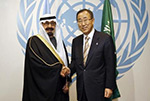 The General Assembly, in its resolution 61/221 of 20 December 2006, decided "to convene in 2007 a high-level dialogue on interreligious and intercultural cooperation for the promotion of tolerance, understanding and universal respect on matters of freedom of religion or belief and cultural diversity, in coordination with other similar initiatives in this area".The General Assembly further decided that the High-level Dialogue would be held in October 2007 at the ministerial or highest possible level, and that there would also be an informal interactive hearing with representatives of civil society, including representatives of non-governmental organizations and the private sector, to be chaired by the President of the General Assembly.The following topics were the main focus of the event: (1) "Challenges of Interreligious & Intercultural Cooperation Today"; and (2) "Best Practices & Strategies for Interreligious & Intercultural Cooperation Going Forward.
The General Assembly, in its resolution 61/221 of 20 December 2006, decided "to convene in 2007 a high-level dialogue on interreligious and intercultural cooperation for the promotion of tolerance, understanding and universal respect on matters of freedom of religion or belief and cultural diversity, in coordination with other similar initiatives in this area".The General Assembly further decided that the High-level Dialogue would be held in October 2007 at the ministerial or highest possible level, and that there would also be an informal interactive hearing with representatives of civil society, including representatives of non-governmental organizations and the private sector, to be chaired by the President of the General Assembly.The following topics were the main focus of the event: (1) "Challenges of Interreligious & Intercultural Cooperation Today"; and (2) "Best Practices & Strategies for Interreligious & Intercultural Cooperation Going Forward. -
2007
"A COMMON WORD BETWEEN US AND YOU"
An Open Letter from the Muslim Community to the Christian Religion in an Effort to Forge Inter Faith Dialogue
 On October 13th 2007, Muslims sent their interfaith message In"A Common Word Between Us and You", an open letter from leaders of the Islamic religion to those of the Christian religion. 138 Muslim scholars, clerics and intellectuals from various countries in different continents unanimously came together for the first time since the days of the Prophet[s] to declare the common ground between Christianity and Islam. In 2008 the initiative was awarded the "Eugen Biser Award", and the "Building Bridges Award", from the UK's Association of Muslim Social Scientist. Since the launch of A Common Word, hundreds of Muslim and Christian scholars, leaders and intellectuals have approved and commented on the initiative; including H.H. the Pope and many grand muftis.
On October 13th 2007, Muslims sent their interfaith message In"A Common Word Between Us and You", an open letter from leaders of the Islamic religion to those of the Christian religion. 138 Muslim scholars, clerics and intellectuals from various countries in different continents unanimously came together for the first time since the days of the Prophet[s] to declare the common ground between Christianity and Islam. In 2008 the initiative was awarded the "Eugen Biser Award", and the "Building Bridges Award", from the UK's Association of Muslim Social Scientist. Since the launch of A Common Word, hundreds of Muslim and Christian scholars, leaders and intellectuals have approved and commented on the initiative; including H.H. the Pope and many grand muftis. -
2007
ELIJAH INTERFAITH INSTITUTE
The third meeting of the board of religious leaders in Amritsar, India
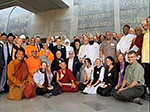 In November 2007 the Elijah Interfaith Institute organized the third meeting of the board of religious leaders with a focus on "Sharing Wisdom: The Case of Love and Forgiveness". With seminars led by scholars of the Elijah Interfaith Academy, the conference elaborated on how religious traditions should, or should not, learn from one another, and consider appropriate boundaries, mechanisms and ways of sharing wisdom. The scholars prepared respective texts, based on the wisdom teachings of the different religions, along with academic position papers, which served as the basis and theoretical framework for the meetings and discussions. By working collaboratively as a team the stage was set for a high level of discussion by suggesting in advance points of commonalities and areas of collaboration amongst the different religions and their leaders. Specific focus was given to the theme of "Love and Forgiveness", a core concern of all religions and an urgent need for today's world.
In November 2007 the Elijah Interfaith Institute organized the third meeting of the board of religious leaders with a focus on "Sharing Wisdom: The Case of Love and Forgiveness". With seminars led by scholars of the Elijah Interfaith Academy, the conference elaborated on how religious traditions should, or should not, learn from one another, and consider appropriate boundaries, mechanisms and ways of sharing wisdom. The scholars prepared respective texts, based on the wisdom teachings of the different religions, along with academic position papers, which served as the basis and theoretical framework for the meetings and discussions. By working collaboratively as a team the stage was set for a high level of discussion by suggesting in advance points of commonalities and areas of collaboration amongst the different religions and their leaders. Specific focus was given to the theme of "Love and Forgiveness", a core concern of all religions and an urgent need for today's world. -
2008
MADRID INTERFAITH DIALOGUE CONFERENCE
The first step to create a UN Council on interfaith dialogue
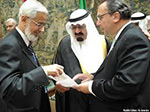 Sponsored by King Abdullah of Saudi Arabia and organized by Mohammed al-Turki and the Muslim World League, the "Madrid Interfaith Dialogue Conference" focused on the foundations and importance of dialogue and the need for peaceful cooperation. Approximately 200 delegates representing Christianity, Judaism, Sunni and Shi'a Islam, Buddhism, Hinduism, and other religious traditions attended; participants also included academics and policymakers. The declaration issued at the end of the conference called for a unified effort to combat terrorism and renew faith-based efforts to address corruption and social problems. It also included a call to avoid the defamation of religions and religious symbols. The conference was viewed as a first step that could spawn an annual interfaith conference, with the potential to lead to the creation of a UN council on interfaith dialogue.
Sponsored by King Abdullah of Saudi Arabia and organized by Mohammed al-Turki and the Muslim World League, the "Madrid Interfaith Dialogue Conference" focused on the foundations and importance of dialogue and the need for peaceful cooperation. Approximately 200 delegates representing Christianity, Judaism, Sunni and Shi'a Islam, Buddhism, Hinduism, and other religious traditions attended; participants also included academics and policymakers. The declaration issued at the end of the conference called for a unified effort to combat terrorism and renew faith-based efforts to address corruption and social problems. It also included a call to avoid the defamation of religions and religious symbols. The conference was viewed as a first step that could spawn an annual interfaith conference, with the potential to lead to the creation of a UN council on interfaith dialogue. -
2008
FIRST MEETING OF THE CATHOLIC - MUSLIM FORUM
Pope Benedict meets with Muslim scholars and religious leaders
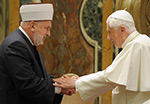 From 4th to 6th November 2008, an unprecedented three-day Catholic-Muslim summit was held at the Vatican, with leaders of both religions hoping to bring a deeper understanding between the two biggest world religions. The annual meeting includes more than 50 participants and is structured as a mostly closed-door workshop amongst scholars. There are Muslim participants from Saudi Arabia, the United States, Libya, Turkey and elsewhere, representing Sunni and Shi'ite and other major strands of the religion. Catholic experts on Islam are also in attendance. The sessions have been built around the dual commandments in both religions: love of God and love of thy neighbor.
From 4th to 6th November 2008, an unprecedented three-day Catholic-Muslim summit was held at the Vatican, with leaders of both religions hoping to bring a deeper understanding between the two biggest world religions. The annual meeting includes more than 50 participants and is structured as a mostly closed-door workshop amongst scholars. There are Muslim participants from Saudi Arabia, the United States, Libya, Turkey and elsewhere, representing Sunni and Shi'ite and other major strands of the religion. Catholic experts on Islam are also in attendance. The sessions have been built around the dual commandments in both religions: love of God and love of thy neighbor. -
2009
WORLD RELIGIONS DIALOGUE AND SYMPHONY (WRDS)
Indian City plays host to His Holiness Dalai Lama in a conference on interfaith cooperation to combat conflict
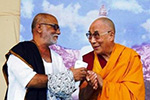 In January 2009, at Mahuva in the Bhavnagar district in Gujarat on Tuesday, the 14th Dalai Lama, Tenzing Gyatso inaugurated an interfaith "World Religions-Dialogue and Symphony" conference, convened by Hindu preacher and renowned kathak, Morari Bapu from January 6th to 11th, 2009. According to Morari Bapu, the conference explored ways and means to deal with the discord among major religions, promote continuous interfaith relations and emphasized the importance of peace between religions and cultures. Emphasising on the importance of peace, His Holiness said, in the troubled times, one must not cease to spread the message of peace. World renowned spiritual leaders including Buddhist leader Samdhong Rinpoche, Diwan of Ajmer Sharij Sayeed Zenul, Bishop Dr Prabalkant Dut and two Shankaracharyas, Dwarka Shankaracharya Jagatguru Swarupanand Saraswati and Kanchikamkoti Pith Shankaracharya Jayendra Saraswati attended the conference.
In January 2009, at Mahuva in the Bhavnagar district in Gujarat on Tuesday, the 14th Dalai Lama, Tenzing Gyatso inaugurated an interfaith "World Religions-Dialogue and Symphony" conference, convened by Hindu preacher and renowned kathak, Morari Bapu from January 6th to 11th, 2009. According to Morari Bapu, the conference explored ways and means to deal with the discord among major religions, promote continuous interfaith relations and emphasized the importance of peace between religions and cultures. Emphasising on the importance of peace, His Holiness said, in the troubled times, one must not cease to spread the message of peace. World renowned spiritual leaders including Buddhist leader Samdhong Rinpoche, Diwan of Ajmer Sharij Sayeed Zenul, Bishop Dr Prabalkant Dut and two Shankaracharyas, Dwarka Shankaracharya Jagatguru Swarupanand Saraswati and Kanchikamkoti Pith Shankaracharya Jayendra Saraswati attended the conference. -
Founded in 2009
THE 9TH INTERFAITH CONFERENCE IN DOHA, QATAR
Spreads the culture of dialogue, the peaceful coexistence of humanity and the acceptance of others
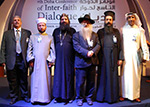 From October 24th to October 26th, the 9th International Conference of Interfaith dialogue in Doha was held at Hotel Sheraton of the Emirate of Qatar with the focus on "Social media and inter-religious dialogue, a new approach". The conference was organized by the center of Interfaith Dialogue in Doha in cooperation with the Foreign Ministry and the University of Qatar.The Minister of Justice Mr. Hassan bin Ampntalla Alganem did the opening of the conference in which participated 240 clergy, scientists, politicians and experienced users of technology, Christians, Jews, and Muslims. Of the Orthodox participated the Patriarchal Vicar of Qatar Archimandrite f. Makarios of the Jerusalem Patriarchate, the deacon Dimitrios Safonof of the Patriarchate of Moscow and lay from Serbia and Romania.
From October 24th to October 26th, the 9th International Conference of Interfaith dialogue in Doha was held at Hotel Sheraton of the Emirate of Qatar with the focus on "Social media and inter-religious dialogue, a new approach". The conference was organized by the center of Interfaith Dialogue in Doha in cooperation with the Foreign Ministry and the University of Qatar.The Minister of Justice Mr. Hassan bin Ampntalla Alganem did the opening of the conference in which participated 240 clergy, scientists, politicians and experienced users of technology, Christians, Jews, and Muslims. Of the Orthodox participated the Patriarchal Vicar of Qatar Archimandrite f. Makarios of the Jerusalem Patriarchate, the deacon Dimitrios Safonof of the Patriarchate of Moscow and lay from Serbia and Romania. -
2010
INTERRELIGIOUS DIALOGUE CONFERENCE
Discussing the functions, rights and responsibilities of religious bodies in a society where religion is often perceived as the embodiment of fundamentalism
 Young Jewish, Muslim and Christian professionals discussed projects and cooperation between faith-based organizations at the Interreligious Dialogue Conference in Seville in 2010. The conference was aimed at developing best practices in the intricate field of interreligious dialogue. Jews, Christians and Muslims, aged to 26 from 40, used the conference as an instrument for improving and developing frameworks for monitoring and preventing anti-semitism, racism, islamophobia, xenophobia and other forms of intolerance. It continues each year to promote interfaith relations and deter the negative connotations of religion.
Young Jewish, Muslim and Christian professionals discussed projects and cooperation between faith-based organizations at the Interreligious Dialogue Conference in Seville in 2010. The conference was aimed at developing best practices in the intricate field of interreligious dialogue. Jews, Christians and Muslims, aged to 26 from 40, used the conference as an instrument for improving and developing frameworks for monitoring and preventing anti-semitism, racism, islamophobia, xenophobia and other forms of intolerance. It continues each year to promote interfaith relations and deter the negative connotations of religion. -
2013
5TH INTERNATIONAL CONFERENCE ON YOUTH AND INTERFAITH DIALOGUE
Create a model for dialogue and peaceful coexistence in order to overcome misunderstandings and stereotypes within the society
 The International Conference, held in April 2013, brought together community members, including representatives of CSOs and Faith-based groups within Nigeria and globally to foster mutual respect between diverse ethnic and religious groups. Furthermore, to support civil society and individuals who seek non-violent approaches to conflict and strive toward a shared future. Since its inception, in October of 2009, the annual International Conference on Youth and Interfaith Dialogue has introduced and supported initiatives that expand shared perceptions among individuals of different religions, cultures, genders, and ethnicities. The Conference will utilize an Interreligious and Intercultural Model for Dialogue and Peaceful coexistence in Nigeria, and a strategy to overcome misunderstandings and stereotypes that affect relations between groups and within societies. The women and men will provide recommendations to decision-makers, institutions and individuals for dignifying everyone and our shared values. In a safe space, the Conference will be a living model for creating prosperity, coexistence beyond war, and restoring friendships and trust.
The International Conference, held in April 2013, brought together community members, including representatives of CSOs and Faith-based groups within Nigeria and globally to foster mutual respect between diverse ethnic and religious groups. Furthermore, to support civil society and individuals who seek non-violent approaches to conflict and strive toward a shared future. Since its inception, in October of 2009, the annual International Conference on Youth and Interfaith Dialogue has introduced and supported initiatives that expand shared perceptions among individuals of different religions, cultures, genders, and ethnicities. The Conference will utilize an Interreligious and Intercultural Model for Dialogue and Peaceful coexistence in Nigeria, and a strategy to overcome misunderstandings and stereotypes that affect relations between groups and within societies. The women and men will provide recommendations to decision-makers, institutions and individuals for dignifying everyone and our shared values. In a safe space, the Conference will be a living model for creating prosperity, coexistence beyond war, and restoring friendships and trust.






















































































